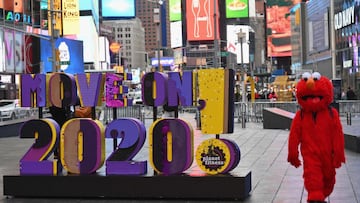Will there be restrictions on New Years' celebrations in the US?
Many US states have reintroduced capacity limits on shopping, dining, and traveling over the Christmas period and right into 2021.

The safest way to celebrate the new year is to celebrate at home with the people who live with you or virtually with friends and family. Staying home is the best way to protect yourself and others as we move into 2021 and a better year for all.
With the arrival of a few approved vaccines, many are feeling hopeful about getting back to a sense of normality. But we're not there yet. As she works with teams to roll out vaccinations to patients, Shruti Gohil, M.D., a medical director as well as a professor within the University of California Irvine's Health System, wishes that the likelihood of covid-19 spread associated with parties was somehow lower. However, the data is increasingly clear: Indoor parties are not safe. "This virus doesn't have any opinions, it doesn't care if you're gathering for a holiday," Dr. Gohil says.
Indoor parties will help spread virus
The most worrying concern, given that covid-19 is currently known to primarily spread through infectious airborne respiratory droplets and aerosols, is that nearly all New Year's Eve parties take place indoors. The latest evidence suggests that poor ventilation in interior spaces leads to the spread of the disease, despite social distancing and sanitization efforts.
In the US, private events behind closed doors have become primary concerns, as many local leaders have already instituted heightened regulations around things like indoor dining and entertainment. Many states have reintroduced capacity limits on shopping, dining, and traveling, and Dr. Gohil explains that "the most common mode of transmission then became private gatherings" in California's Orange County. "Much more of the uptick in cases really did happen post-Thanksgiving," she adds. "I think that's what's happening across the nation where you're seeing the surge.
Restrictions across the US
Many cities and states have rolled out restrictions and cancellations to their New Year's Eve programming for residents and visitors. In New York, the renowned Times Square ball drop will be held digitally. Fireworks will not go off on the Las Vegas strip this year, while each municipality is different, there may be special guidelines or regulations in your city or town that prohibits public venues from hosting large crowds, resulting in cancellations of public New Year's Eve events.
Travel is being moderated now more than ever before, with 25 states currently restricting travel in some fashion, per the New York Times. You should avoid traveling via public transport or across state lines for New Year's Eve, Dr. Gohil advises.
State, local, and territorial governments may have travel restrictions in place, including testing requirements, stay-at-home orders, and quarantine requirements upon arrival. For up-to-date information and travel guidance, check the state and local health department where you are, along your route, and where you are going. Prepare to be flexible during your trip as restrictions and policies may change during your travel.
If traveling by air, check if your airline requires any health information, testing, or other documents. Local policies at your destination may require you to be tested for covid-19. If you test positive on arrival, you may be required to isolate for a period of time.
New Year’s celebrations with family and friends
Staying home and celebrating with the people you live with or celebrating virtually with loved ones is the safest choice this year. Do not attend large gatherings this year. If you do host or attend a small gathering, everyone can take steps to make celebrating the New Year safer.
If you are travelling, the CDC has the following recommendations. Also take these actions for 14 days after you return from travel to protect others from getting covid-19:
- Stay at least 6 feet/2 meters (about 2 arm lengths) from anyone who did not travel with you, particularly in crowded areas. It’s important to do this everywhere — both indoors and outdoors.
- Wear a mask to keep your nose and mouth covered when you are in shared spaces outside of your home, including when using public transportation.
- If there are people in the household who did not travel with you, wear a mask and ask everyone in the household to wear masks in shared spaces inside your home.
- Wash your hands often or use hand sanitizer with at least 60% alcohol.
- Avoid being around people who are at increased risk for severe illness.
Related stories
- Watch your health: Look for symptoms of covid-19, and take your temperature if you feel sick.
- Follow all state and local recommendations or requirements after travel.

